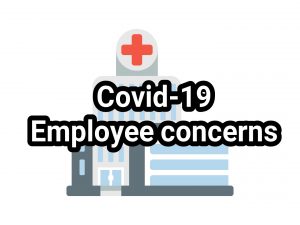The Equal Employment Opportunity Commission (EEOC) has been issuing guidance for employers about how federal discrimination laws relate to the COVID-19 pandemic. Specifically, disability discrimination laws cross paths with employers’ efforts to mitigate the risk of COVID-19 transmission in the workplace. Today’s Long Island employment law blog discusses some of the most recent guidance issued by the EEOC, the government agency responsible for enforcing federal discrimination laws. Our previous blogs discussed EEOC guidance issued earlier this year.
Employees with high risk family members at home have expressed concern about returning to work for fear of contracting coronavirus and spreading it to their families. The Americans with Disabilities Act requires employers to provide reasonable accommodations to employees with disabilities. The EEOC has already indicated that employers may be required to provide reasonable accommodations to employees who face higher risks from covid-19. But, do employers have to provide accommodations because of an employee’s family member’s risk to coronavirus? The latest EEOC guidance says employers are not required to accommodate an employee because a family member is at risk.
Federal anti-discrimination laws, such as the ADA and Title VII, also prohibit an employer from creating a hostile work environment against employees based on the employees membership in a protected class, such as having a disability or based on race or national origin. The June 2020 EEOC guidelines remind employers to be mindful of their obligation to prevent workplace discrimination. As it relates to coronavirus, the EEOC suggested that employers be “alert” to comments directed at employees based on employees of Chinese or Asian national origin. Comments from co-workers about the origins of coronavirus may be discriminatory. Though not particular to COVID-19, the EEOC reminds us that harassment can take the form of e-mails, phone calls, and video chats. In other words, use of technology is no defense to a claim of discrimination.
Other June 2020 guidelines include clarifications about requests for reasonable accommodations. The ADA allows employers to notify employees that they can request reasonable accommodations, if needed, when they return to the workplace. Employers can designate contacts for different types of accommodation requests. For instance, employers can designate one person as the point of contact for disability related accommodations and another person for pregnancy related accommodations, and another person for child care related accommodations.
Concerning accommodations, the EEOC noted an important distinction about age discrimination. The EEOC noted that the ADA requires employers provide accommodations, but the Age Discrimination in Employment Act does not require accommodations be given to employees based on age. In other words, employees concerned that their age poses a risk based on coronavirus are not entitled to accommodations from their employers.
What if an employer is concerned that an employee is at risk? For instance, can employer prevent a pregnant employee from entering the workplace because it is concerned for the employee’s safety? Even though the employer may be genuinely concerned and trying to act in the best interests of the pregnant worker, taking action against the employee would be considered discrimination.
Finally, the EEOC directly answered a question which we discussed in a previous blog: can employers lawfully require employees to take a covid-19 anti-body test? On June 17, 2020 the EEOC said such tests are not lawful. The EEOC determined that anti-body tests are not consistent with a business necessity so they constitute unlawful medical examinations in the workplace. But, the EEOC reminded employers that tests which determine active infections of COVID-19 are lawful. The EEOC’s decision on anti-body testing is consistent with our predictions from earlier blogs.
As promised, we continue to watch the developments in employment law related to coronavirus. If you questions about the EEOC latest guidance, anti-body testing in the workplace, or any other covid-19 related employment law question, contact a Long Island employment lawyer at 631-352-0050.

Covid-19 Employee concerns
 Long Island Employment Law Blog
Long Island Employment Law Blog

